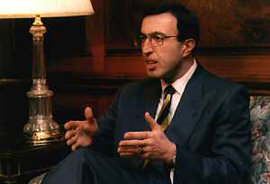 Breaking the chains of the past Breaking the chains of the past
Like all the countries of former Communist bloc the Bulgarian economy was closely tied to the Comecom (the trading organization of the communist countries), i.e. modeled to produce specific goods for specific markets, not taking into account the basic laws of supply and demand. The main industrial sectors developed in Bulgaria were electronics, chemicals , machinery and processed food. Agricultural production was concentrated on grain, sugar beets, tobacco and dairy.

Bulgaria was the most popular and cheap tourist destination in the Soviet bloc due to its magnificent nature - a combination of wonderful sea resorts, along with both severe and friendly mountains,caves, lakes and mineral springs.
After the collapse of communism Bulgaria lost many of its main export destinations due to the severe competition for opening markets of former communist countries and due to its uncompetitive production because of obsolete technology and lack of good management. Moreover Bulgaria not only suffered from dependence on Russia for oil and gas but also from the introduction of market prices for those same products. Needless to talk about the burden of its external debt, amounting to over USD 10bn. Furthermore Bulgaria suffered huge losses from two international embargoes - against Iraq (with USD
2bn. outstanding debt to Bulgaria) and against Serbia and Montenegro (hindering Bulgarian trade links with Europe and causing significant loss of transit revenue).
Bulgarian transition to democracy and market economy
was quite controversial. Chronic economic crises,
never-ending political quarrels and controversial
acting of people in power that kept the nation permanently
divided went hand in hand with efforts to rebuild
the economy and settle down the rules of civil society.
It was November 1996 when an opposition candidate
- Peter
Stoyanov - won the presidential elections and
set a simple, romantic-sounding task - to unite
the Bulgarian nation. |

Itseemed that this 44 years-old lawyer, former Deputy Minister of Justice appeared in the right place, at the right time. A nation that badly needed political consent about the way it should follow, a nation that badly wanted someone to unite it, at last got it - an overwhelming president who put national interests above everything and started acting without wasting time. And the miracle came true - day by day the number of people that trusted and followed their president started growing. It took only a short time for the external world to acknowledge that this time Bulgaria was not only on the right way but led by the right people.
"After 45 years of political monologues in this country, my self as well as most of the other politicians here have realized and recognized the need for a political dialogue - a current, ongoing, honest , open dialogue with the population. Briefly what has changed is the regained trust of the people in the state and in their politicians and I believe it doesn’t sound again immodest: It is the regained trust of the external world to this country", says Peter Stoyanov.
Several months after the new president took power his Union of Democratic Forces party won Parliamentary elections and formed a cabinet that joined the president’s efforts to rebuild the country.
|

